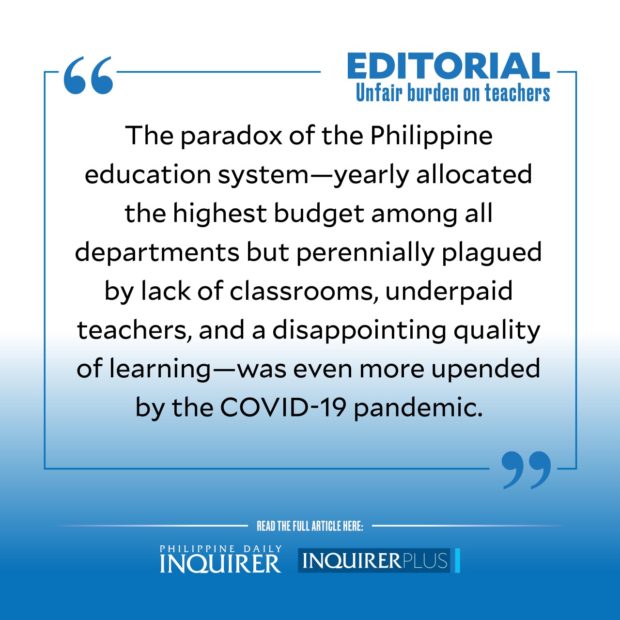Unfair burden on teachers
 Hardly has the sour taste faded over the use for political propaganda of modules from the Department of Education (DepEd) when comes another issue it may have overlooked.
Hardly has the sour taste faded over the use for political propaganda of modules from the Department of Education (DepEd) when comes another issue it may have overlooked.
This time, the problem centers on the need to refurbish classrooms as more than 10,000 public and private schools were recently given the go-signal to resume in-person classes in areas under pandemic alert levels 1 and 2. As revealed last week by the Teachers Dignity Coalition (TDC) and the Alliance of Concerned Teachers (ACT), the burden of retrofitting classrooms has fallen on lowly-paid public school teachers who’ve had to shell out their own resources to do so.
According to TDC chair Benjo Basas, teachers have been taking out loans or soliciting funds from private donors to buy paint, iron sheets and glass panes for the classrooms, as well as providing free labor to make them safe and ready for in-person teaching. Similarly, ACT said its school visits in Tarlac showed that teachers spent their own money to prepare classrooms for face-to-face classes.
Article continues after this advertisementBasas explained that teachers had to resort to this because “if the classrooms were not improved, (it is considered) the teacher’s fault.”
Added ACT secretary general Raymond Basilio: “Our teachers are eager for in-person learning to resume as the learning crisis has reached alarming levels. However, it is not fair that they and their already too meager salaries are made to bear the burden of physically preparing the schools.’’
Where is the budget for the expansion of in-person classes, the teachers’ groups asked. The DepEd earlier announced that it had allocated P1 billion to support the transition to limited physical classes, including the procurement of television sets, speakers, and laptops in classrooms to support the blended learning system.
Article continues after this advertisementOn top of this unreasonable added burden, teachers are also protesting the planned 20-percent tax on the P2,000 travel allowance of those who will serve as poll watchers in the May 9 elections, an increase from the previous 5 percent. ACT said this means a deduction of P400 from the measly allowance approved for the teachers doing the extra job of helping in the elections.
“This government is squeezing us dry,” said Vladimer Quetua, ACT National Capital Region union president.
The paradox of the Philippine education system—yearly allocated the highest budget among all departments but perennially plagued by lack of classrooms, underpaid teachers, and a disappointing quality of learning—was even more upended by the COVID-19 pandemic. In one of the world’s longest lockdowns, Philippine schools were closed, and online learning became the norm, an abrupt transition that proved inaccessible to many poor students who could not afford the gadgets and connectivity needed to participate in online classes.
This disruption affected the right to learn of as many as 27 million Filipino students, the United Nations Children’s Fund (Unicef) reported in August last year. Another Unicef report released last week proved even more depressing. In a joint report with the UN Educational, Scientific and Cultural Organization and the World Bank titled “Where are We on Education Recovery?”, Unicef said schools in the Philippines had the longest closure of more than 70 weeks, when the global average was only 20 to 21 weeks among the 122 countries covered by the report.
As a result, Unicef reported that 15 percent of Filipino schoolchildren, or about three in every 20, could not read simple texts. This translates to 85 percent of 10-year olds who cannot read or understand a simple story, higher than the 69.5 percent in 2019 before the pandemic struck.
While the return to school is a welcome development and a boost to the economy, must teachers bear the responsibility for ensuring that classrooms are safe and well-maintained under the new normal? Shouldn’t teachers be more focused on nurturing their students’ minds while helping them readjust to physical classes? With hybrid systems now in place, teachers must have the skills to conduct simultaneous in-person and online classes, without having to worry about the loans they’d have to repay or the slimmed down paycheck they would now have to stretch further because of classroom refurbishing costs.
Then, there is the matter of the government’s unfulfilled promise of raising teachers’ salaries, which lag behind that of soldiers and the police who’ve had hefty pay increases under the Duterte administration. ACT said that with an average gross pay of P23,877 a month, “teachers can barely afford the minimum cost of living” which was pegged at P25,091 in July last year.
When will the government stop paying lip service to the plight of teachers, the indispensable workforce who shapes the minds of future generations? For so long, we’ve asked so much of them, but given back so little. It’s about time the government gives teachers their fair share for their selfless service to the country.
















